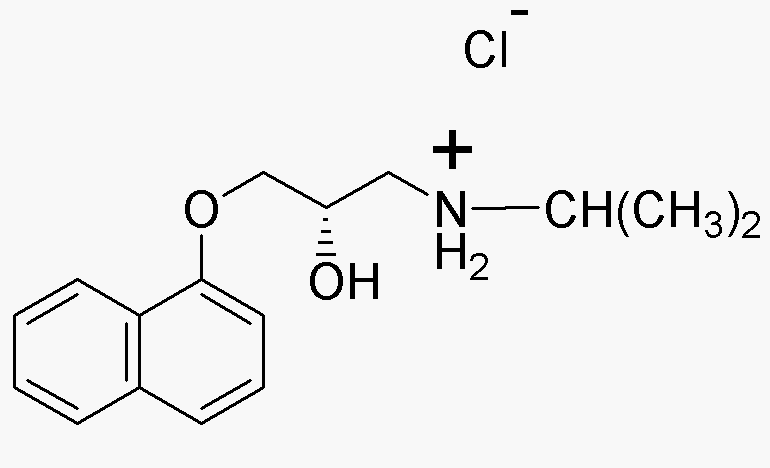2S-(-)-Propanolol hydrochloride is widely utilized in research focused on:
- Cardiovascular Research: This compound is primarily used in studies related to hypertension and heart disease, helping researchers understand its effects on blood pressure regulation.
- Pharmacology: It serves as a model compound for testing beta-blockers, allowing for the evaluation of drug interactions and efficacy in various therapeutic settings.
- Neuroscience: The compound is explored for its potential effects on anxiety and stress responses, providing insights into its role in treating anxiety disorders.
- Drug Formulation: In pharmaceutical development, it is used to create formulations that enhance bioavailability and patient compliance, particularly in oral medications.
- Clinical Trials: It is frequently included in clinical studies to assess its safety and effectiveness in diverse populations, contributing to evidence-based medicine.
General Information
Properties
Safety and Regulations
Applications
2S-(-)-Propanolol hydrochloride is widely utilized in research focused on:
- Cardiovascular Research: This compound is primarily used in studies related to hypertension and heart disease, helping researchers understand its effects on blood pressure regulation.
- Pharmacology: It serves as a model compound for testing beta-blockers, allowing for the evaluation of drug interactions and efficacy in various therapeutic settings.
- Neuroscience: The compound is explored for its potential effects on anxiety and stress responses, providing insights into its role in treating anxiety disorders.
- Drug Formulation: In pharmaceutical development, it is used to create formulations that enhance bioavailability and patient compliance, particularly in oral medications.
- Clinical Trials: It is frequently included in clinical studies to assess its safety and effectiveness in diverse populations, contributing to evidence-based medicine.
Documents
Safety Data Sheets (SDS)
The SDS provides comprehensive safety information on handling, storage, and disposal of the product.
Product Specification (PS)
The PS provides a comprehensive breakdown of the product’s properties, including chemical composition, physical state, purity, and storage requirements. It also details acceptable quality ranges and the product's intended applications.
Certificates of Analysis (COA)
Search for Certificates of Analysis (COA) by entering the products Lot Number. Lot and Batch Numbers can be found on a product’s label following the words ‘Lot’ or ‘Batch’.
Número de catálogo
Número de lote/lote
Certificates Of Origin (COO)
This COO confirms the country where the product was manufactured, and also details the materials and components used in it and whether it is derived from natural, synthetic, or other specific sources. This certificate may be required for customs, trade, and regulatory compliance.
Número de catálogo
Número de lote/lote
Safety Data Sheets (SDS)
The SDS provides comprehensive safety information on handling, storage, and disposal of the product.
DownloadProduct Specification (PS)
The PS provides a comprehensive breakdown of the product’s properties, including chemical composition, physical state, purity, and storage requirements. It also details acceptable quality ranges and the product's intended applications.
DownloadCertificates of Analysis (COA)
Search for Certificates of Analysis (COA) by entering the products Lot Number. Lot and Batch Numbers can be found on a product’s label following the words ‘Lot’ or ‘Batch’.
Número de catálogo
Número de lote/lote
Certificates Of Origin (COO)
This COO confirms the country where the product was manufactured, and also details the materials and components used in it and whether it is derived from natural, synthetic, or other specific sources. This certificate may be required for customs, trade, and regulatory compliance.


